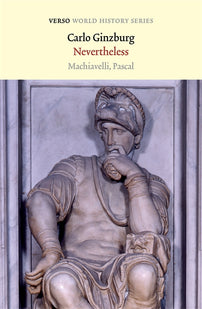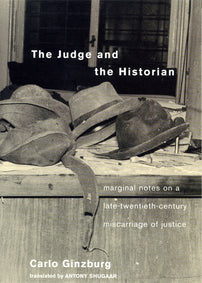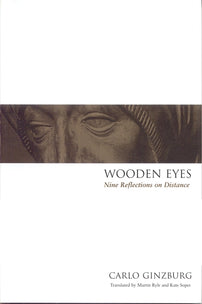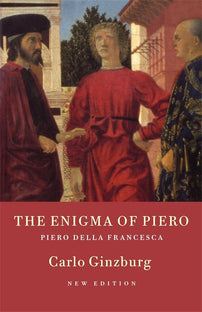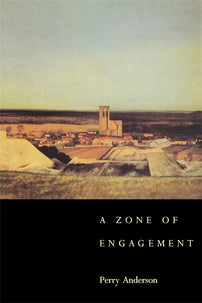A Catholic God does not exist
From Pope Francis to Pascal’s Provincial Letters, a new essay in historical detection from Carlo Ginzburg, peerless author of Nevertheless

1.
Some years ago – 2013, to be precise – I started leafing through a bundle of newspaper back issues that had accumulated in my study. Suddenly, I chanced on an issue of Repubblica featuring a dialogue between the paper’s founder, Eugenio Scalfari, and Pope Francis. My eye fell upon a sentence spoken by the Pope: ‘I believe in God, Not in a Catholic God, a Catholic God does not exist. What exists is God’. I was dumbfounded: I could never have imagined a Pope declaring himself an adherent of a natural religion common to all the world’s peoples. Almost at once I searched on Google to see how people had reacted to this sentence. To characterize the reactions – especially those from senior clergy in the USA – as polemical would be an understatement. They extended from frank indignation to scarcely veiled charges of heresy. But surfing the net I came across an unexpected piece of information: the sentence was attributable not to the Pope but to Carlo Maria Martini, Archbishop of Milan and subsequently Cardinal. Decades apart, two Jesuits – Pope Bergoglio and Cardinal Martini – had formulated the same disconcerting thesis: ‘A Catholic God does not exist’. And so?
2.
What I have recounted thus far is utterly banal. It could have happened to anyone. Here, with the emergence of this research, it is appropriate to say something about the person asking the questions – in this case, the person who is speaking. I shall confine myself to essentials. I am a Jew; I have not received any religious education; I do not (unfortunately) know Hebrew. Persecution, of which I retain imperishable memories, made me a Jewish child during the war. Religions fascinate me. I have devoted much of my work as a historian to religious phenomena. I am an atheist.
3.
To return to Archbishop Carlo Maria Martini. I knew of his international fame as a Biblical scholar; I knew he had established a ‘chair for non-believers’. In 1997 I received a letter (unfortunately temporaily lost among my utterly disorganized papers) in which, at length, the Archbishop discussed an article I had published in Repubblica, entitled ‘Pope Wojtyla’s Slip’, on John Paul II’s famous visit to the Synagogue of Rome. The fact that the sentence ‘You cannot turn God into a Catholic God’ was spoken by a figure such as Martini suddenly seemed to me to be very important. Spoken for the first time? The question was unavoidable for someone who is a historian by profession. But before projecting myself, gropingly, into the past, I must return for a moment to today’s newspaper. A quick search on Google immediately brought home to me that the seven years since the interview with Pope Francis in Repubblica have not been empty. Insults directed at the Pope, demands for his resignation, accusations of ‘creeping atheism’ are too many to mention. I shall not concern myself with them, not here at any rate.
[book-strip index="1" style="display"]4.
The convergence of two Jesuits like Pope Bergoglio and Cardinal Martini on a claim – ‘A Catholic God does not exist’ – that is far from banal inevitably prompts a hypothesis: namely, that the roots of this idea are to be found in the history of the religious order of which they were (and, in the case of the Pope, still are) members. To summarize, even briefly, the history of the Jesuit order would obviously be absurd. I shall confine myself to recalling that the Society of Jesus, founded by Ignatius Loyola in 1534, was recognized as a religious order by Pope Paul III in 1540. The Society’s extraordinarily novel features have been the subject of intense celebration and polemic over the centuries. In particular, the so-called controversy on ‘Chinese rites’, which revolved around the Jesuits’ attitude to religious customs in China, deemed too accommodating by many, led to the Society’s suppression in 1773. In 1814 it was restored throughout the world. The qualification ‘throughout the world’ is far from obvious: since the order’s foundation Jesuit priests have conducted unprecedented missionary activity in Asia, Africa and the Americas. Here I shall say something of their attempt to evangelize China.
5.
The endeavour began in 1582 when Father Alessandro Valignano, visitor to the Jesuit missions in Asia, sent two missionaries to Macao: Matteo Ricci, born 1552 in Macerata and died 1610 in Beijing; and Michele Ruggeri, born 1543 in Spinazzola near Bari and died 1607 in Salerno – two extraordinary figures, even if Matteo Ricci’s fame has obscured that of Ruggieri. Both had learnt Chinese. To Michele Ruggieri we owe the first European book printed in China: a catechism, published in 1584, which was translated into Chinese from a Latin version, Vera et brevis divinarum rerum expositio, addressed to the Superior General of the Jesuit order, Rodolfo Acquaviva.[1] Structured as a dialogue between a Christian minister and a pagan philosopher, the catechism was written for anti-Buddhist purposes. But the Jesuit authorities ajudged it too polemical and withdrew it from circulation in 1593. Ten years later, they replaced it by a catechism by Matteo Ricci, likewise in Chinese, published in 1603. In this instance the dialogue takes place between a ‘Western man of letters’ and a ‘Chinese man of letters’. The Catechism was accompanied by a sub-title: ‘The True Meaning of “Heavenly Master”’. Given my ignorance of Chinese, I have relied on the Italian translation, edited by Gianni Criveller, head of the Pontifical Institute for Foreign Missions, and the Dominican Antonio Olmi, professor at the Catholic University of Milan, published in 2013.
Addressing the ‘Chinese man of letters’, the ‘Western man of letters’ says:
You, sir, desire above all to investigate the One who created heaven, earth and the ten thousand beings, and exercises His immutable authority over them. I maintain that nothing under the sun is more evident of the truth of his existence. Who has never raised his eyes and looked at the sky? So doing, there is no one who does not sigh silently to himself and say: ‘In the midst of it all there must surely be Someone there who rules over it!’ This someone is none other than the Heavenly Master, who in our Western countries is called Deus.[2]
As we can see, this approximates to the thesis that ‘A Catholic God does not exist’ formulated at the summit of the Society three centuries later. The Jesuits’ openness towards the religious rites and beliefs of the countries to be evangelized was tried out in India prior to being reformulated in China. An openness or, more precisely, an adaptation, a strategy referred to in Latin by the term accomodatio. But accomodatio of the Christian message by Jesuit missionaries had two sides to it: one positive and one negative. On the one hand, elements of the religion of the countries to evangelize were connected to the Christian religion through an exercise in translation: ‘the Heavenly Master, who in our Western countries is called Deus’. On the other, the Christian message was transmitted maintaining silence about some of its elements. But which? Matteo Ricci’s Catechismo provides an answer. The dialogue between the ‘Western man of letters’ and the ‘Chinese man of letters’, having touched on such themes as the immortality of the soul, the fate of souls in the afterlife, the ‘refutation of false teachings [i.e. Buddhism] on reincarnation’, arrived at Christian doctrine proper. The ‘Western man of letters’, spokesman for Matteo Ricci, presents it as follows:
A very long time ago in the West there were many wise men. Thousands of years ago, they predicted the incarnation of the Heavenly Master in detail, in the canonical Scriptures…. Verifying his works, these completely coincide with the prophecies of the old sages. He travelled through many places teaching the people; commanded the deaf to hear, and at once they heard; commanded the blind to see, and at once they saw; commanded the dumb to speak, and at once they spoke; commanded lame to walk, and at once they walked; commanded the dead to come back to life, and at once they were resurrected. Heaven and Earth, evil spirits and good spirits, feared and honoured Him, and all obeyed His commands. Thus He fulfilled what had been written by the wise men of old and brought to fruition what was contained in ancient Scripture, so that these great teachings could be communicated to the world. When His work disseminating the Way was finished he ascended to Heaven, in the clear light of day, at the time expressly foreseen by Him.[3]
6.
What is lacking in this presentation of Christianity? The answer is obvious: Christ’s crucifixion and resurrection. This did not prevent Pope Benedict XVI from presenting Matteo Ricci in 2010, 400 years after his death, as ‘a singular instance of a happy synthesis between the Gospel message and dialogue with the culture of the people to whom it is being carried’.[4] In reality, as Father Olmi, one of the translators of Ricci’s Catechismo, observes, ‘on Christian Revelation there is unquestionably more still to be said: what is to be said is the essential thing – namely, that the Son of God, made man, died and rose again for us’. In fact, Father Olmi goes on, this Catechismo, ‘and the theology that inspires and guides it, are indispensabe to the evangelization of China, because, employing reason and language, they lead to the upper bounds of reason and language’.[5]
In other words, this was an option dictated by a gradual strategy. On the basis of this theology, the evangelization of the Chinese planned by Matteo Ricci began by presenting a Christianity purged of the crucifixion and resurrection – along (as we have seen) with a God identified with the ‘Heavenly Master’.
7.
Up to this point, seeking to retrace in the history of the Society of Jesus the roots of the sentence ‘A Catholic God does not exist’ spoken by Pope Francis, I relied on the research of others. Now (quite unexpectedly) I came upon a theme I had dealt with in my last book, Nevertheless: Machiavelli, Pascal. In one of his Provincial Letters, directed against casuistry, especially of the Jesuit variety, Pascal observed that in India and China the Jesuits ‘suppress the scandal of the Cross and preach only a glorious and not a suffering Jesus Christ’.[6] One of the sources of this information, the theologian Tomás Hurtado, was cited along with two other authors hostile to the Jesuits by Johann Ludwig Fabricius, in his Euclides Catholicus, published under the pseudonym Ferrarius in 1667. I have devoted a chapter of Nevertheless to this highly complex text. I shall not recapitulate my analysis here. I shall merely say that Fabricius/Ferrarius started out from Pascal’s Provincial Letters to propose, in sarcastic and paradoxical fashion, a form of civic, anti-Christian religion. The models proposed by Fabricius/Ferrarius were Mohammed; the ‘most religious’ Machiavelli; and the ‘method of Christian catechism’ disseminated by the Jesuits ‘in the provinces of East Asia’. Here is what that ‘method’ consisted in:
When [the Jesuit missionaries] realized that what remained of the teaching of the apostles in Europe, however little, contained something unpalatable and repugnant which already in the past seemed like folly to the Greeks and scandal to the Jews, they did not preach Christ crucified, the only one Paul professed to know, but a different Christ – beautiful, magnificent, dressed in Chinese costume – who in the past had descended from the heaven in great pomp and announced the reign of our Pontiff.[7]
8.
Hence over the centuries the missionary strategy of the Society of Jesus has been interpreted, sometimes in favourable and sometimes in hostile fashion, as a ‘happy synthesis’ between the Gospel and the culture of other peoples, or as a path to natural religion (or even secularization). An enigma – even for someone who considers Bergoglio, the first Jesuit Pope, as the last link in a long historical chain. In any event, it is a chain that began long before the Second Vatican Council, which according to the apostolic nuncio Carlo Maria Viganò – the figure who called for the pope’s resignation – sealed a deplorable ‘modernist’ turn.
With this we come back to today. I refrain from forecasts about what is unfolding before our very eyes. We are dealing with the last frame (for now) of an age-old film. But this cinematic metaphor has perhaps now been superseded by a different metaphor – the computer screen, which seems to cancel temporal depth: a symptom (and a cause) of the attenuation of historical perception in contemporary societies. A very serious loss, but not an inevitable one: something we must struggle against, also making use of the computer.
9.
By way of a very slight example I wanted to show that, retrieving the depth of history, the world we live in proves different, more complex, richer. And perhaps, to echo a famous sentence, a perception of this complexity will help to change it.
Text read on-line (6 February 2021), with small variations, on the occasion of the award of the Luciano Russi prize. Nevertheless: Machiavelli, Pascal is available now from Verso.
Translated by Gregory Elliott
[1] Vera et brevis divinarum rerum expositio (in Opere storiche del padre Matteo Ricci S.I., 1911-13, Vol. II, pp. 498-540). And see Jacques Gernet, ‘Sur les differentes versions du premier catechisme en chinois de 1584’, Studia Sino-Mongolica. Festschrift für Herbert Franke, ed. Wolfgang Bauer, Wiesbaden 1979, pp. 407-16.
[2] Matteo Ricci, Catechismo. Il vero significato di ‘Signore del Cielo’: Un sincero dibattito su Dio, ed. Antonio Olmi, Bologna 2013, p. 113.
[3] Ricci, Catechismo, p. 463.
[4] Quoted by Mgr. Claudio Giuliodori in an appendix to ibid., p. 492.
[5] Introduction to ibid., p. 88.
[6] Blaise Pascal, Lettres provinciales, V: ‘suppriment le scandale de la Croix, et ne prêchent que Jésus-Christ glorieux, et non pas Jésus-Christ souffrant’.
[7] Cf. Carlo Ginzburg, Nevertheless: Machiavelli, Pascal, London and New York: Verso, 2022, p. 232–3.
[book-strip index="2" style="display"]